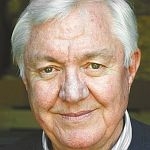 (Dunsmore) Nearly every American knows that during the presidency of
(Dunsmore) Nearly every American knows that during the presidency of
Abraham Lincoln, the Civil War was fought and won by the North, the
slaves were freed and Lincoln was assassinated. But as commentator and
veteran ABC News correspondent Barrie Dunsmore tells us this morning,
Americans who wish to know more about their country’s greatest president
will be well served by going to see the new motion picture "Lincoln."
(Dunsmore)
More often than not I have been disappointed with movie versions of the
lives of historically notable people. Usually these films come across
as superficial. But that is absolutely not the case with director Steven
Spielberg’s latest film titled simply "Lincoln." Based on part of
historian Doris Kearn’s Goodwin’s book Team of Rivals, the film is
historically accurate – from its exquisitely authentic feel of the
1860s, to most of the dialogue of its principal characters. The cast is
outstanding from top to bottom. And Daniel Day- Lewis’ portrayal of
Lincoln is truly one for the ages.
One of the reasons Spielberg
succeeds is that he has limited his scope by focusing on just a few
months of 1865. At that point, Lincoln had already been re-elected to a
second term and it was fairly certain that the North was going to win
the Civil War. Yet for Lincoln there was one more battle to be fought –
the loss of which in his mind would nullify all the Union victories in
four years of battles and the extraordinary sacrifices made to achieve
them.
In what was opposed even by many of his allies, Lincoln
decided he must do battle in the United States House of Representatives
to achieve a two thirds majority in favor of what would be the 13th
amendment to the U.S. Constitution – making slavery unconstitutional. I
think most people today just assume that Lincoln’s Emancipation
Proclamation issued two years earlier would have accomplished that.
Yet
as Lincoln points out, the emancipation document was based on the
president’s war powers, so once the war was over the proclamation could
well be repealed – especially if the South should make that repeal a
condition of its willingness to end the war, which indeed it tried to
do. Much of the film depicts the epic political struggle which Lincoln
won – ultimately by just two votes – guaranteeing the end of slavery in
America forever.
But as the promos say – you know the legend,
now meet the man. The Lincoln we get to meet is not the man of marble
staring out from his Memorial on the National Mall. He is wise and moral
and a great story teller who laughs at his own sometimes crude jokes.
He is wily and manipulative and not above playing the down and dirty of
politics – which makes him especially relevant for today .
Meantime,
the weight of Lincoln’s burden of carrying the nation through four
years of bloody civil war is sometimes more than he can bear – as when
he erupts with anger at his cabinet, shouts at his wife or slaps the
face of his grown son. Such outbursts are short-lived and he soon
retreats back into his then near perpetual state of melancholy.
It
is this very human Lincoln that most Americans do not know – which
makes the film very much worth seeing and of course, made the real
Lincoln the great president he truly was.